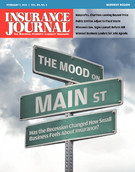A Republican-controlled Assembly committee approved a bill that would repeal minimum automobile coverage levels, sending the bill to the full chamber for a vote. The GOP-authored proposal would wipe out minimum coverage levels for liability and uninsured motorists created in the state budget and replace them with lower standards.
The committee amended the bill to eliminate another budget provision that made underinsured motorist coverage mandatory. Those who opt to purchase it would have to get at least $50,000 per person and $100,000 per accident in coverage.
The Republican plan to scale back mandatory car insurance levels would make driving in Wisconsin riskier and leave injured motorists holding the bag, the proposal’s critics said.
But Republicans say the public didn’t get a chance to sound off on the mandates enacted in the 2009-2011 state budget. They argue the minimums are too high and have driven insurers to raise premiums, forcing people to forego insurance.
Democrats and their allies complained at a hearing before the Senate and Assembly insurance committees that reduced coverage levels would deprive injured drivers of money they need to recover and no hard evidence shows the budget mandates have contributed to higher premiums.
The 2009-2011 budget made car insurance mandatory in Wisconsin. It also laid out minimum coverage levels for liability and underinsured and uninsured motorists. Car insurance would is mandatory under the new bill, but minimum levels would drop. For example, current liability minimums of $50,000 for injuring or killing one person, $100,000 for injuring or killing two people and $15,000 for property damage would drop to $25,000, $50,000 and $10,000.
Topics Auto
Was this article valuable?
Here are more articles you may enjoy.


 The $3 Trillion AI Data Center Build-Out Becomes All-Consuming for Debt Markets
The $3 Trillion AI Data Center Build-Out Becomes All-Consuming for Debt Markets  Data Center Boom Offers Organic Growth Opportunities for Brokers Like Aon, Marsh
Data Center Boom Offers Organic Growth Opportunities for Brokers Like Aon, Marsh  Winter Storm Fern to Cause Up to $6.7B in Insured Losses
Winter Storm Fern to Cause Up to $6.7B in Insured Losses  Beazley Agrees to Zurich’s Sweetened £8 Billion Takeover Bid
Beazley Agrees to Zurich’s Sweetened £8 Billion Takeover Bid 


